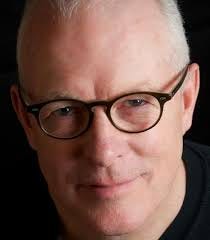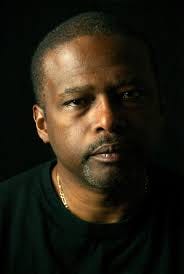Kevin Carey & Jeffrey Renard Allen Read at the Writers' Series

By: Joe McGurn
Once again, on the evening of November 3, 2016, Salem State University’s Writers’ Series featured two outstanding authors, Professor Kevin Carey, of Salem State University, and Professor Jeffrey R. Allen, of the University of Virginia. Professor J.D. Scrimgeour, Coordinator of the Series and Creative Writing, introduced both writers.
Professor Carey read from his newly published book of poetry, Jesus was a Homeboy. Combine professor Carey’s poetry with his modulated and gravelly voice and you are sure to have an audience craving to hear more. Carey’s secret of success is that his poems tell stories that are truly affecting. They may seem mundane, at first, but they address complex and sometimes disrupting situations. The poems read include the following:
“Jesus was a Home Boy” a poem about a veteran who disrupts his friends, neighbors, and anyone else who would tolerate his unending talking:
…talked day after day, night after night talked to the traffic, the cab drivers, the police, the priests, the nuns, talked to the guys in the steam room at the YMCA and the kids playing basketball in the schoolyard who called him Jezu the cooku…
“Revere Beach After Dark, “ – a poem about a 90 degree summer’s night when people lined up to buy a late dinner from a clam shack on the beach:
It’s after midnight, still 90 degrees, The customers are twenty deep at each window, most of them drunk, all of them on the make, all of them hungry. We push food at them like one might throw meat at a wild bear; fried clams, roast beef sandwiches, lobster rolls. The more they eat, the more they come…
Other poems included: “The Weird Kid,” a funny and self-effacing poem about himself, and “Looking at an Old Man in the Pleasant Street Tea Room,” was perhaps his most poignant poem about his mother who lived 96 years but the last few were plagued by memory loss. In it he expresses the sadness that all people must share when they remember the vibrancy and intelligence of their parents now surrendered to the past:
My mother remembers things she can’t tell me, she says, Did you hear the good news? and then goes quiet trying to think of what it was. The other day she wrapped half a sandwich In a napkin and asked me To give it to the man on the television. She doesn’t know it’s hard to see her this way
He finished his reading with the following three poems, “Get Thee to a Nunnery”, “The Center of Bill Russell” and “Chicago,” about his stay at his son’s apartment in Chicago. His son goes to college there but is out with his girlfriend while the speaker looks out the window of the apartment recollecting how, not that long ago, he and his wife and his two kids hung out together like a pack but now, sadly, those days are over:
I remember a time when we were always together, traveling in a pack, to the store, to the Friendly’s at Gloucester Circle, to Ireland and Spain, and it hits me that I’ve been a fool to think that time is my friend, and there is plenty of it
Professor Carey explores life’s existential problems and challenges, the disruptive ones, the sad ones, the ones that people shun. Yet he presents them with candor so that they are approachable even in their starkness. While most of the poems were drawn from Jesus Was a Homeboy, at least two other poems read were independent of the book but carried the same insights as those in the book.
Professor Carey earned an MFA from Farley Dickinson University in New Jersey. In addition to Jesus was a Home Boy, he is the author of The One Fifteen to Penn Station (Cavan Kerry Press, 2012) and The Beach People (Red Bird Chapbooks, 2014.) In 2012, he co-directed a documentary, on the life of poet Maria Mazzitti Gillan, All That Lies Between Us. Professor Carey teaches Creative Writing here at Salem State University.

The evening’s second author was Jeffrey Renard Allen, who earned his PhD in English (Creative Writing) - at the University of Chicago and now teaches at the University of Virginia. Professor Allen is the author of three books of prose, Holding Pattern, Rails under My Back, and Song of the Shank, and two books of poetry, Harbors and Spirits and Stellar Places. In his introduction for Allen, J.D. Scrimgeour quoted Allen himself who wrote online concerning his own “experimentation,” with writing and stated that experimentation…
He framed an important set of questions any writer should ask: What are the boundaries of a literary endeavor? What is a novel? What are the aesthetic limits of the form? What can be used? What can’t be used? Can it be a part of biography? Can it be history? My experience as a novelist is that once I start working on a project, my imagination is open to the world. Anything and everything is going to get inside, even if it gets written out after an initial draft. You don’t know where the material is going to end up.
Dr. Allen’s presentation was not taken from any of his published works. It was a galley for a new novel about the improbable friendship and camaraderie between Jimmy Hendrix (November 27, 1942- 11 - September 18, 1970) and the Irish-born, British artist, Francis Bacon (28 October 1909 – 28 April 1992.) Bacon was an artist, traveler, gambler, and heavy drinker. According to CNN (11/26/2013,) his painting Three Studies of Lucian Freud, sold for $142,405,000. That was the highest price paid for a painting up to that time. This was an improbable relationship because, as Allen points out, these two men never met. Allen, nevertheless, invented a world where they could become friends and spent time together drinking and smoking, in the bazaars of Morocco.
His story concerning Hendrix and Bacon confirms his belief, or perhaps assertion, that imagination opens up to the world for a writer. In the question and answer period after his reading he stated that about 90% of what he writes is pure fiction and not based on real events. He did, however, admit that he may takes bits and pieces of his life, or someone else’s life, and weave it into his stories. When questioned about whether a writer should take risks with his writing, he responded that, "risk makes you a better writer than you are. It broadens the things that you want to do."
Allen also offered advice to budding writers. He suggested that they should read as much as they can. He also stated that writers need a schedule to get their writing done. In his case he rises each morning at about 5:00 A.M., and starts writing. He went on to state that writers need discipline to write and to, “believe that they have something to say.” On the subject of writing, Allen added a little bit of a sour note but not one that has not been heard before, and that is that only a few writers are successful financially from their writing. He himself, works a professor because his novels and poetry do not provide enough income to support him. However, as a writer, he has no plans to stop writing and he proved it on the evening of November 3rd, when he read section of his newest novel, still in progress.
It was another successful and entertaining Writers’ series reading. The next presentation will be on November 29th , 7:30 P.M. in the Martin Luther King Room.


